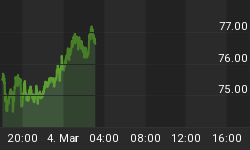There is an ongoing debate among investors and economists about whether the US economy is in the midst of an economic recovery or at the edge of a double-dip recession. Both sides of the debate seem too optimistic as even those who are cautious about the economy are only assigning a 50% chance to the double dip scenario. In our view, the economy is in a depression and, therefore, the argument should be centered on how long it will take people to realize the extent of the economy's problems.
During the bear market rally that lasted from March 2009 through April 2010, many people believed that the US was experiencing a strong economic recovery. However, since the stock market peak on April 26, 2010, investors are now considering, but largely dismissing, the possibility of a double-dip in the economy. In fact, Europe's recent sovereign crises and China's decision to tighten lending requirements on real estate purchases have been rationalized as temporary factors. Meanwhile, US economic and housing statistics have started to roll over, but the debate remains one about slow versus strong growth.
This is not the first time a debate of this type has existed while the economy was in a depression. Following the stock market crash in 1929 a rally in equities of nearly 50% took place from November 1929 through April 1930. That market advance led investors and businessmen to think that stocks had risen because the economy would resume its growth trajectory. Yet when the rally ended in April 1930, equities fell another 86% through July 1932. However, despite falling stock prices, people did not acknowledge that the economy was in a depression until the economic collapse was well underway. We believe the economy and the stock market are at the same juncture as they were in 1930. Figure 1 shows the initial stock market decline following the peak in April 1930, which correlates closely to the current Dow Jones Industrial Average shown in Figure 2.
Figure 1. 1928-1930 Dow Jones Industrial Average
Source: Yahoo! Finance, Continental Capital Advisors
Figure 2. 2005-2010 Dow Jones Industrial Average
Source: Yahoo! Finance, Continental Capital Advisors
Figure 3 is the full bear market of the Great Depression.
Figure 3. 1928-1932 Dow Jones Industrial Average 
Source: Yahoo! Finance, Continental Capital Advisors
Government stimulus has led to economic statistics that misrepresent the underlying state of the economy. Although interest rates have been 0% for over a year and a half and the Federal Reserve has tripled the assets on its balance sheet, equity markets and economic statistics are deteriorating. Even more worrisome is that the US is more levered today than at any other time in its history. Although optimists hope that further quantitative easing by the Federal Reserve will stimulate the economy, they are ignoring Japan's historical example of how continuous quantitative easing has not helped Japan's troubled economy (see "Quantitative Easing Does Not Guarantee Higher Stock Prices"). Eventually, when the Government has exhausted all means and the stock market has fallen to new lows, people will realize the existing depression.















